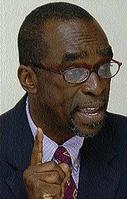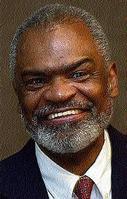Gareth Manning, Sunday Gleaner Reporter


Dr. Wendel Abel, Dr. Earl Wright and Dr. Ken Baugh
Despite the commencement of the process over 40 years ago, there is doubt in the mind of some health professionals as to whether the country's mental health structure is being prepared for its decentralisation.
Speaking with The Sunday Gleaner, Opposition Spokesman on Health, Dr. Kenneth Baugh, says while he supports Government's transition towards treatment of the mentally ill within their communities or closer to them, he feels the nation is not being adequately prepared to move in that direction.
Decentralise mental health
In 1966, the Government adopted a move to decentralise mental health care and increase the treatment of the mentally ill in areas closer to their communities and eventually phase out psychiatric institutions such as the Bellevue Hospital in the Corporate Area. Admissions have dropped there by more than two thirds in the last 40 years, moving from about 3,000 residents to 776 residents.
"No real provisions have been made for this decentralisation. I am supportive of it and community care and secondary care, but the arrangements have to be adequate," says Dr. Baugh.
He believes more mental health officers are needed if the system is to be run properly and hospitals modified to accommodate mentally ill patients. The system, he says, needs 80 to 100 mental health officers. However, it has only been operating with 32 officers, a mild increase over the 28 it had 20 years ago.
Dr. Baugh is proposing that instead of phasing out Bellevue all together, it should be transformed into a neuro-psychiatric institute to provide high-level care for the mentally ill in the Corporate Area, as well as act as a central point of high standards of care for the mentally ill islandwide. The institute, he is proposing, should also act as a centre for patients with neurological diseases.
"There is no doubt in my mind that there is need for patients to be cared for in Bellevue for a period of time and the first one is emergency care. I have many examples of many people who needed emergency care and could not get admitted and they have done harm to people," he claimed. "There is at least one mother who was killed by her son, after she tried unsuccessfully to get him to be admitted to Bellevue," Dr. Baugh reported.
Last September, Myrtle Oliver and her two teenage sons, Omar and Omeil, were bludgeoned with a sledge hammer by Myrtle's eldest son 28-year-old Christopher in a vicious Thursday-night attack. His three-year-old daughter, who was with Ms. Oliver at the time of the incident, was also injured during the attack.
According to Dr. Baugh, those kept in some hospitals are not adequately cared for due to a lack of mental health officers and a lack of accommodation. The lack in each parish in general has led to several lapses in the system, he argues, leading to the increased numbers of mentally ill people on streets and in the island's prisons. He says the mentally ill cannot be accommodated on the ordinary wards inside hospitals and special provisions have to be made for them.
Inadequate
Dr. Baugh is getting some support from a medical practitioner, who is the mother of a mentally ill son. Asking that her identity be kept concealed, she agrees there is not enough provision within the hospitals for patients with mental illnesses. She adds that clinics and non-governmental organisations are not adequate either as they cannot provide emergency care, particularly on weekends.
But senior lecturer in the Department of Community Health and Psychiatry at the University of the West Indies, Dr. Wendel Abel, and head of mental health unit in the Ministry of Health, Dr. Earl Wright, both disagree that the de-centralisation of mental health care has so far failed. They say, in fact, there are 27,000 people who have been successfully treated and are functioning normally in different areas of society.
Dr. Wright asserts that each administrative health region now has two psychiatrists, and there are 45 mental health nurses islandwide. There are 72 psychiatric aides and 40 more are to be employed by year end.
But the doctors admit that there is some problem in staffing general nurses.
"Mental health training is a premium requirement for most developed countries, therefore many nurses with this training tend to migrate," Dr. Wright bewails, pointing to the resultant depletion in the cadre needed to effectively manage the system.
The doctors also acknowledge there is some amount of weakness in the system in the southern section of the island due to issues with policy implementation.
"Services are generally poor in the southern part of the island due to policy issues. Only up until recently we had a psychiatrist postedin that part of the island," Dr. Abel reports.
Dr. Wright indicates those problems are being addressed through added funding from the National Health Fund. The funding will go to community support groups such as the Clarendon Association of Street People and the Ebenezer Home in Mandeville.

